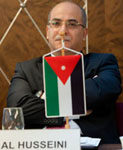 H.E. Mr. Hussam Abdullah Al Husseini, Ambassador of the Hashemite Kingdom of Jordan, addressed in his speech to the 23rd Meeting of the Board of Directors of the Austro-Arab Chamber of Commerce (AACC) held in Hotel Palais Hansen Kempinsiki in the first district of Vienna before the its members, several Arab Ambassadors to Austria and international organizations, diplomats attached to missions and honorary members of the Chamber, and guests the challenges which faces Jordan energy.
H.E. Mr. Hussam Abdullah Al Husseini, Ambassador of the Hashemite Kingdom of Jordan, addressed in his speech to the 23rd Meeting of the Board of Directors of the Austro-Arab Chamber of Commerce (AACC) held in Hotel Palais Hansen Kempinsiki in the first district of Vienna before the its members, several Arab Ambassadors to Austria and international organizations, diplomats attached to missions and honorary members of the Chamber, and guests the challenges which faces Jordan energy.
He said: “Jordan is facing real challenges in securing its energy supply due to:
- - Almost no indigenous energy resources and high dependency on imported energy. (Almost 97%).
- - Oil prices (Energy imports accounted for 21% of GDP in 2012 “4631 million JD).
- - Continued increase in demand
- - high growth of primary energy demand (5.5% annual)
- - high growth electricity generated capacity (7.4%).
About Jordan Potential, Amb. Husseini stated,
- Jordan’s location can play a major role in linking Energy networks among the countries of the region (oil, gas and electricity) and provide a regional energy hub.
- Jordan has a huge potential Renewable Energy utilization (wind, solar).
(Solar radiation 5 -7 Kwh/m per day with 300 sunny days per year and wind speed of 7 – 11 m/s).
- Jordan has a huge potential energy resources based on its reserves of Oil shale and Uranium.
- Jordan potential of oil and gas reserves is still under exploration.
About Jordan’s main efforts, Amb. Husseini said,
- Restructuring oil market, and liberating oil products prices by adopting on international parity pricing plan for oil products and opening the market for competition.
- Establishment of Electricity Regulatory Commission in 2003.
- Structuring regulatory framework that includes
- General Electricity Law
- Renew able Energy and Energy Effeciency Law
- Energy Law (in progress).
Jordan’s Strategy
A target of 10% renewable energy input into the energy mix by 2020 was drawn in Jordan’s Energy Strategy> It mainly aims at generating 1200MW of electricity from wind sources and 600MW from solar.
As for Regulatory Framework:
The Renewable Energy and Energy Efficiency Law was passed as a permanent Law in April 2012.
This law, the first in region, allows investors to identify and develop grid-connected electricity production project through the so called unsolicited or direct proposal submission.
It allowed us to create the Jordan Renewable Energy and Energy Efficiency Fund, which aims to channel financial resources to the end.
- A well-founded reference price list for different renewable technologies was issued in May 2012, with preferential prices for local content (local manufacturing).
- Net-Metering for small Re System (Roof Tops( with Fixed Purchase Prices for Excess Power,
- And a Tax Incentive regime.
Regarding the Direct Proposals Approach
- (64) Expressions of Interest were received in 2012
- Thus (30) MOUs were signed with a total Capacity of 850 MW (split between Solar and Wind)
- (12) PV solar proposal were received in March 2013 with total capacity of (201)MW, currently under final evaluation.
- The first Wind Direct Direct Proposal submission project for 115 MW in the South is in the final negotiation phase.
- And the next round of announcement for new submissions was launched beginning of August 2013, and the dead line for EOIs submissions was set on November 14. 2013.
As for the Competitive Bidding and the EPC Approach
We have announced the first rank bidder for the First IPP (90) MW Wind Energy Project, also in the South, to be operational by mid 2014.
We launched the Tender Process for a (70 MW) Wind Project to be developed on a Turnkey concept (EPC basis), (6) proposals were received by the deadline on August 29 2013.
Also in the pipeline, another (70) MW PV project to be developed on the same EPC concept. Currently under the prequalification Process.
A Quick Reference to Energy Efficiency
- A By-law was recently issued that regulates the EE activities, part of its requirements are:
- Mandatory SWH for New buildings as of April 2013-11-16
- ESCOs market to be regulated,
- EE Labeling is obligatory to all Electrical appliances.
- And EE Bulbs Schemes for Residential and Public Buildings.
Accordingly, Jordan has laid down the necessary policy frameworks as well legal and commercial tool for Renewable Energy and is ready now to attract and receive commercial investments in this field in order to achieve our policy y targets in the national energy mix.
 H.E. Mr. Hussam Abdullah Al Husseini, Ambassador of the Hashemite Kingdom of Jordan, addressed in his speech to the 23rd Meeting of the Board of Directors of the Austro-Arab Chamber of Commerce (AACC) held in Hotel Palais Hansen Kempinsiki in the first district of Vienna before the its members, several Arab Ambassadors to Austria and international organizations, diplomats attached to missions and honorary members of the Chamber, and guests the challenges which faces Jordan energy.
H.E. Mr. Hussam Abdullah Al Husseini, Ambassador of the Hashemite Kingdom of Jordan, addressed in his speech to the 23rd Meeting of the Board of Directors of the Austro-Arab Chamber of Commerce (AACC) held in Hotel Palais Hansen Kempinsiki in the first district of Vienna before the its members, several Arab Ambassadors to Austria and international organizations, diplomats attached to missions and honorary members of the Chamber, and guests the challenges which faces Jordan energy.









No comments:
Post a Comment